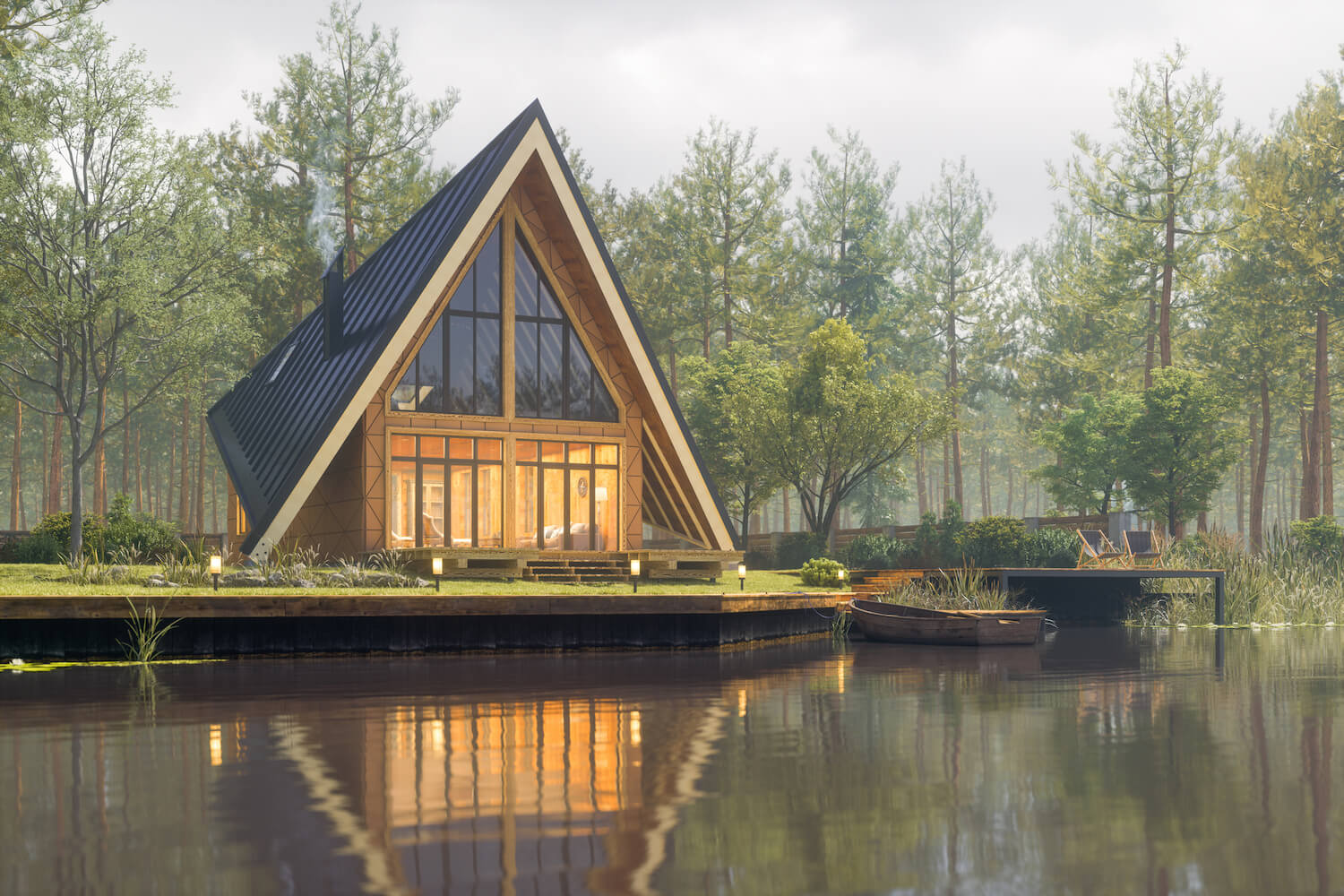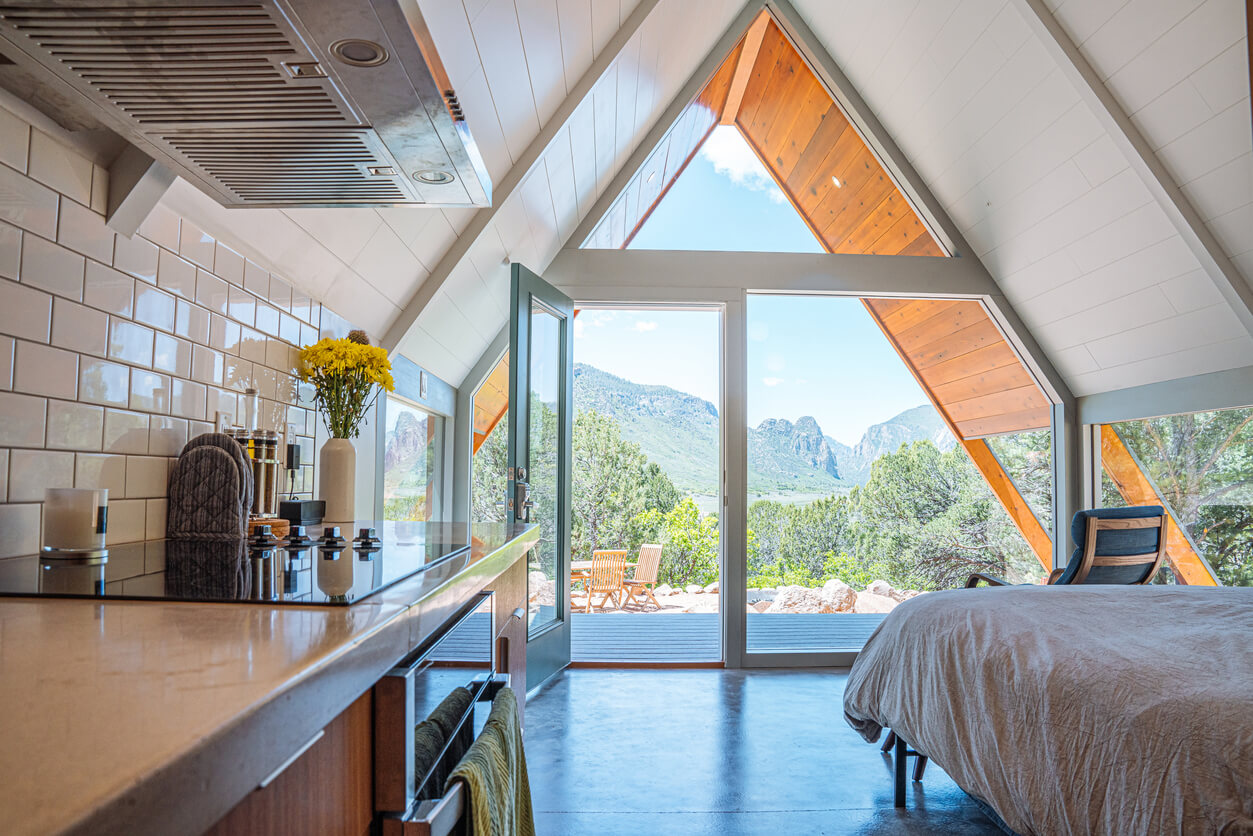
By Cloudbeds
Since 2007, Airbnb has welcomed travelers from nearly every country in the world to a new and ground-breaking form of accommodation. It’s also given property owners the opportunity to turn their residences and private rooms into income-generating vacation homes.
Why do hosts and travelers alike choose Airbnb, and how does it compare to other major online booking sites?
What makes Airbnb different from competitors?
Airbnb is an international accommodation company and vacation rental platform trusted by homeowners and travelers around the world. With more than 5 million hosts in 220+ countries worldwide, Airbnb is unique from the typical hotel accommodation experience.
Founded in San Francisco in 2007, Airbnb revolutionized the vacation rental industry by making the community-based, home-sharing business model mainstream. From a condo in Florida to a private room in Tokyo, a flat in London, or a luxury vacation home in Los Angeles, short-term rental accommodation providers now have a trusted platform to access the vacation rental market.
Airbnb prides itself on allowing guests to “experience the world in an authentic, connected way” by letting them stay in a living space rented out and hosted by a local.
Why do people use Airbnb?
For vacation rental hosts:
Renting your home to others can be an excellent way to earn extra income. As of 2024, an Airbnb host made an average of $1,910 per month; however, hosts can earn up to $25,000 per month depending on location and property type.
Furthermore, it’s a lot more flexible than running a hotel, as you can decide your own cancellation policy, when you want to open your home to travelers, and whether you want to rent the whole unit or just a room.
Property owners can even host their guests remotely using contactless technologies like mobile entry apps for remote check-in, smart temperature control, and even noise monitoring services. And with booking fees easily collected online with secure credit card processing, receiving payments can be done without a hassle.
As an Airbnb host, you also have free insurance called ‘AirCover’ in case something in your rental gets damaged. AirCover includes:
- Guest identity verification
- Reservation screening
- $3M USD host damage protection
- $1M USD host liability insurance
- $1M USD experiences liability insurance
- 24/7 safety line
For travelers:
Compared with staying at a hotel, booking a vacation rental is not only more affordable in many cases – it also gives you the unique opportunity for a more local experience. Airbnb aggregates properties from around the world in various categories, including OMG! (out-of-the-box accommodations), amazing views, historical homes, and much more.
In October 2024, Airbnb announced new updates for travelers, including:
- Personalized app with redesigned search filters based on past bookings and current search requirements
- Welcome guides to help navigate the app and book their first stay
- New payment methods, including Vipps, Mobile Pay, MoMo, and P24
What is the price range for Airbnb?
Airbnb listings includes a service fee for both guests and hosts – guests pay a mandatory service fee of ~12%, while hosts pay 3% of the booking subtotal (nightly rate + your cleaning fee, but not including Airbnb taxes and fees).
The service fee covers the cost of Airbnb services like:
- 24/7 customer support
- Payment processing
- Marketing to guests via Google, social media, and more
- Educational resources for hosts
- Damage protection
Hosts who are wondering how they should price their properties can get a property management system (PMS) with an integrated revenue management tool to help track the local vacation rental market and optimize pricing accordingly.
28 Airbnb alternatives
As trusted and well-known as Airbnb is, there are similar vacation rental sites. Some competitors of Airbnb offer extra benefits, while others have specialized in catering to a particular type of visitor. Here, we’ve broken down 28 of the best Airbnb competitors.
Global Airbnb competitors
1. Vrbo
Part of the HomeAway group, Vrbo (originally known as “Vacation Rentals by Owner”) is the world’s second-largest short-term rental company, next to Airbnb. Primarily targeting families, Vrbo has 2 million listings worldwide – from apartments to villas.
Since Vrbo is owned by HomeAway, which is a part of the Expedia group, if you list one of your properties on Vrbo, it will automatically be cross-listed on Expedia. This saves you the trouble of having to make a separate listing.
Despite this, however, Vrbo has fewer rental listings compared to Airbnb’s 6.6 million. One of the main differences is that, unlike Airbnb, you also can’t list shared spaces on Vrbo.
2. Wimdu
With over 350,000 home rentals, from luxurious villas on the Spanish coast to studio apartments in Paris, Wimdu boasts “the largest selection of vacation rentals worldwide.”
While this number is impressive, the listings are still much smaller than Airbnb’s.
Since Wimdu is based in Germany, the company also attracts more travelers from Europe. Wimdu is powered by HomeToGo, a search engine for vacation rentals that also operates Tripping.com
3. Booking.com
Part of The Priceline Group, which owns the Kayak brand, Booking.com is one of the world’s largest and most well-known online travel agencies with listings in 227 countries and support in over 40 languages. It is headquartered in Amsterdam but has a strong global presence.
Unlike Airbnb, Booking.com emphasizes traditional hotel rooms instead of living spaces hosted by locals. Still, it’s a good place to get visibility on your property.
4. Expedia
The owner of large sites like Hotels.com and Trivago, Expedia is one of the largest online travel agents – attracting millions of bookings each year. As such, a property listing on Expedia’s website offers excellent visibility.
Expedia also offers hotels, car rentals, and flights so it caters to a much larger audience than other Airbnb alternatives that only focus on short-term rentals.
5. TripAdvisor
Tripadvisor is primarily known for reviews of hotels, restaurants, and activities, but it also features an accommodation listing directory and specialized tours.
TripAdvisor also includes HouseTrip, HolidayLettings, and Flipkey – three sites that boast the largest selection of holiday home rentals in the world.
Because of this, the number of listings on TripAdvisor is much larger than Airbnb – over 7.3 million (including accommodation, airlines, restaurants, etc.)
6. Agoda
The leading online travel booking site in Asia, Agoda is a Singapore-based travel agency with 2 million property listings, including both hotels and private homes.
In addition to accommodations, Agoda also offers airport transfer services and a loyalty program known as “PointsMAX,“ where travelers can earn points for each booking they make.
These points can then be spent on things like discounted airline tickets.
7. Trip.com
Another Singapore-based online travel agency, Trip.com, has over 1.4 million hotels in 200 countries and regions.
In addition to accommodation, Trip.com also offers car rentals through some of the world’s largest car rental companies, including Hertz, Avis, and Europcar.
Compared to Airbnb’s maximum period of stay, which allows for stays longer than 30 days, properties listed on Trip.com have a maximum stay period of 30 days.
8. GlampingHub
GlampingHub is a site set up specifically to promote glamping (i.e., luxury-style camping accommodations with upscale amenities and services) and eco-friendly travel.
The company has over 22,000 campsites, ranches, and unique accommodation options – guests can rent anything from luxury treehouses to traditional Mongolian Yurt tents, and even train cabooses converted into living spaces.
GlampingHub differs from Airbnb because they focus on glamping and outdoor-style accommodations.
9. Sonder
Sonder has been rapidly increasing its market share and currently has 9,000 units in 40+ countries. They’re known for delivering seamless, personalized guest experiences backed by a strong technology foundation.
Sonder is different from Airbnb in that they create their own spaces and don’t rely on hosts — combining the comforts of vacation rentals and hotels into unique spaces that fulfill needs without sacrificing style.
10. Homestay.com
Homestay.com connects travelers with hosts who offer shared accommodations in their homes. The platform emphasizes cultural exchange, allowing guests to live with locals and often experience meals or guided activities as part of their stay.
Unlike Airbnb, Homestay.com focuses on shared accommodations where the host is present and actively involved in the guest experience. It’s a more immersive option for travelers seeking a local connection.
11. Homes & Villas by Marriott
Homes & Villas by Mariott connects travelers with luxurious and professionally managed vacation homes. Guests can enjoy amenities like professional cleaning, concierge support, and the ability to earn and redeem Mariott Bonvoy points.
Marriott focuses exclusively on upscale properties, ensuring consistent quality and hotel-like services, unlike Airbnb.

Regional Airbnb competitors
12. Traveloka
One of the largest online travel agents in Asia, Traveloka has about 100,000 listings on its website (mostly in Asia), including hotels, guest houses, and even homestays.
Unlike Airbnb, Traveloka has fewer listings and a smaller audience of about 50 million people. Despite this, however, they also offer car rentals and airport transfer services.
13. Despegar/Decolar
Known as Decolar in Brazil and Despegar throughout the rest of Latin America, this site is one of Latin America’s most experienced travel agencies with listings worldwide.
Aside from accommodation, Despegar also offers car rentals, flights, and accommodation travel packages.
While Airbnb emphasizes home rentals, Despegar is mostly a traditional travel agent. However, they have a growing inventory of houses and apartments for rent and offer a lot of visibility for travelers in Latin America.
14. eDreams
Based in Barcelona, eDreams (part of the ODIGEO group) is one of the world’s leading online travel brands, operating in 40 countries and serving 18 million customers. They have a big presence in Europe. eDreams also offers a wide selection of flights, hotel packages, car rentals, and vacation homes.
In comparison to Airbnb, eDreams still has a heavier hotel-based inventory. However, much like many other OTAs today, their inventory of short-term rentals and vacation homes is growing.
15. PegiPegi
PegiPegi is an Indonesia-based OTA with a listing directory of over 25,000 hotels and 7,500 travel guides. Most of the hotels and destinations listed in their directory are located in Indonesia. Their listings include guest houses, cottages, and serviced apartments.
PegiPegi primarily targets Indonesian travelers and doesn’t have the same global presence that Airbnb does.
16. Rakuten
Officially known as “Rakuten Travel Xchange,” this site has almost 700,000 accommodation listings, from traditional hotels to rental properties.
Rakuten has a particularly strong presence in Japan, and although it has listings in a total of 200 countries, its global brand awareness isn’t as strong as Airbnb’s.
Aside from that, out of the 700,000 properties listed on Rakuten’s website, 500,000 of those are traditional hotels.
17. Riparide
On their website, Riparide states their goal is to “inspire people to unplug from modern-day trappings and find fulfillment in nature.”
In addition to nature-inspired short-term rental accommodations, Riparide also features “Riparide Stories,” – a type of travel story where other guests share their experiences and what they did during their stay.
As Riparide only has listings in Australia, they don’t have the same global presence as Airbnb.
18. Stayz
Stayz is an Australian vacation rental platform offering family-friendly holiday homes across Australia. It focuses on whole-property rentals for families and groups, with an emphasis on beachside and countryside properties.
Stayz has a niche market of Australian travelers and primarily offers entire homes, whereas Airbnb has a broader inventory.
19. Cottages.com
Cottages.com specializes in holiday cottages and unique rural accommodations, primarily in the UK and Europe. It caters to travelers looking for countryside getaways and offers a range of rustic to luxury properties.

Niche Airbnb competitors
Certain companies have created niche websites with inventory meant to attract guests seeking unique properties. Like Airbnb, they, too, offer accommodation, albeit for people with a specific interest.
20. Anyplace
Anyplace is very similar to Airbnb in many ways – it also offers fully furnished co-living spaces that people can rent for a more local experience.
Unlike Airbnb, however, Anyplace has begun narrowing down its inventory to apartments specifically made to attract the increasing amount of remote workers in the last few years.
21. Coliving
Coliving.com offers accommodation based on the principle of “the value of community.” In addition to their living spaces, Coliving.com provides plenty of opportunities for business networking or to make new friends during your stay.
In addition to their opportunities for socializing, Coliving.com’s prices include cleaning and laundry services – something Airbnb charges extra for.
22. 9flats
With 6 million homes available for rent, 9flats can be considered the European version of Airbnb, offering apartments, guest houses, rooms, and more.
However, compared with Airbnb, the audience of 9flats is much smaller – below 1 million.
23. Instant World Booking
With accommodations in over 5000 cities worldwide, Instant World Booking is an OTA that prides itself on the adventure that travel brings.
Their listings include unique and affordable hotels, hostels, and apartments around the world.
24. Only-Apartments
Founded in Barcelona in 2003, Only-Apartments specializes in short-term rental accommodations, including apartments, holiday rentals, and apart-hotels. Currently, their inventory includes more than 150,000 accommodations spread over 120 countries around the world.
Though their inventory is only a small fraction of Airbnb’s, Only-Apartments has a global presence in a niche market that includes many desirable destinations in Europe and the US.
25. Habicus Group
Habicus Group is a leading provider of serviced apartments with an extensive corporate and private client base. They specialize in providing high-end and luxury serviced apartments for business travelers.
Compared to Airbnb, which attracts mainly vacationers, Habicus Group offers short-term rental providers the unique opportunity to book business travelers.
26. Plum Guide
Plum Guide is not just a booking platform but a benchmark for quality, having vetted 500,000 vacation rentals since its inception in 2016 to ensure that travelers never encounter a disappointing stay.
Unlike Airbnb, every listing on their platform has been vetted and selected based on a set of criteria that they call “the science behind the perfect stay,” created by a group of architects, travelers, interior designers, and psychologists.
27. Hipcamp
For travelers looking for a more outdoorsy experience, there’s Hipcamp, a platform to reserve private RV spots, cabins, treehouses, and campsites (both rustic and glamping).
On Airbnb, campers have to search across categories to find a spot for their next trip, but on Hipcamp, it’s easy to find the exact outdoor experience that you’re looking for.
28. The Dyrt
The Dyrt‘s target audience is outdoor enthusiasts, offering listings for campsites, RV parks, and glamping accommodations across the US.
Compared to Airbnb, The Dyrt is tailored specifically for nature-focused travelers seeking camping or glamping experiences.
Final thoughts
Airbnb’s growth is no secret: what began as a way to rent out an extra room in your apartment has grown into the largest community-based travel platform — ranging from private rooms to entire homes and boutique hotel rooms. Whether through Airbnb or one of the many Airbnb competitors and alternatives, hospitality businesses have the opportunity to reach new travelers.


















